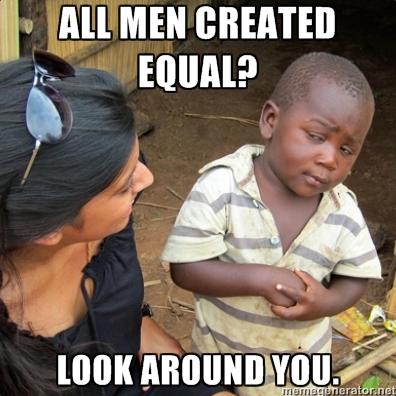…To debunk the fallacies of equality does not depend as much on might or brute force as on subtle, seemingly miniscule but powerful actions taken every hour and every day.” – Prof. Patricia Kameri Mbote, SC., 24th January 2013.
Equality remains a difficult and deeply controversial social ideal. At its most basic and abstract, the idea of equality is a moral idea that people who are similarly situated in relevant ways should be treated similarly. This idea of equality has found its way into Kenya’s Constitution under Article 27, which states that every person is equal before the law and has the right to equal protection and equal benefit of the law. Equality, we are told, includes the full and equal enjoyment of all rights and fundamental freedoms.
Prof. Kameri Mbote in her recent Inaugural Lecture discussed the paradoxical reality whereby the practical application of equality and non-discrimination as enshrined in the Constitution resulted in discrimination and inequality. In the context of intellectual property law, the idea of equality is indeed problematic given that the State may be said to discriminate indirectly against Kenyans on several grounds.
Take for instance the recent public appointment of members to the Competent Authority under the Copyright Act (aka the Copyright Tribunal), one may argue that these appointments were made in breach of Article 27(8) of the Constitution which states as follows:
“…the State shall take legislative and other measures to implement the principle that not more than two-thirds of the members of elective or appointive bodies shall be of the same gender”
The Competent Authority, appointed by the Attorney General last year, has five members and four of them are male including the Chairperson. At the time of this blog article, it was not possible to conclusively ascertain whether the other key state IP agencies (KIPI and ACA) had adhered to the 1/3 minimum gender rule in all post-2010 appointments to their respective Boards and other organs. Coincidentally, this blogger has previously discussed the emerging jurisprudence around this gender rule in the Constitution and its impact on the implementation of the IP provisions within the same Constitution.
Returning back to the issue of fallacies of equality, it may be noted that while the Constitution provides that the State shall not discriminate on the basis of language, the reality on the ground is that this form of discrimination does in fact exist. The most vivid example is the use of English in all IP laws and related policies whereas the Constitution provides under Article 7 that the official languages of Kenya are Kiswahili and English. In the same vein, one notes that all the key IP Offices are only situated in the capital city Nairobi therefore not all Kenyans are able to enjoy equal protection and equal benefit under IP law.
Another possible area of discrimination may be found in the application of the Trademarks Act, in particular Section 14. This section reads as follows:
“No person shall register as a trade mark or part of a trade mark any matter the use of which would, by reason of its being likely to deceive or cause confusion or otherwise, be disentitled to protection in a court of justice, or would be contrary to law or morality, or any scandalous design.” (Emphasis mine)
This provision gives the Registrar of Trademarks a wide discretion in determining what amounts to immoral, offensive or scandalous. This discretion, depending on the context, may be exercised in a matter that amounts to discrimination on the grounds of social origin, culture, conscience and/or belief.
Over and above these scenarios, there are also other instances where inequalities may exist through the practical application of IP law. A case in point is the on-going tax collection technovation tussle between the Kenya Revenue Authority (KRA) and one of its employees, Samson Ngengi.
The section of the Industrial Property Act which deals with technovations (utility models) includes the following provision:
“101. (1) Any dispute concerning the application of this part shall be submitted by any interested party to an arbitration board consisting of three members: one member appointed by the employee or technovator, one member appointed by the enterprise, and a chairman appointed by the two members. The arbitration board shall hear interested parties and thereafter deliver its ruling.”
From the above provision, one notes that this provision makes arbitration proceedings mandatory in all cases of dispute over technovations. In this regard, it may be argued arbitration is cost prohibitive for the average Kenyan.
From the few examples discussed, what emerges is a need to develop interventions and strategies aimed at ensuring that certain inequalities and exclusions are not entrenched through interpretation and implementation of IP law. In this regard, institutions like CIPIT must continue to be active in facilitating access to information that will allow Kenyans to fully enjoy their IP rights as provided in the Constitution. Not to mention that the State must always be reminded of its obligations in creating a suitable environment for Kenyans to fully develop, harness and exploit their IP both locally and internationally.
